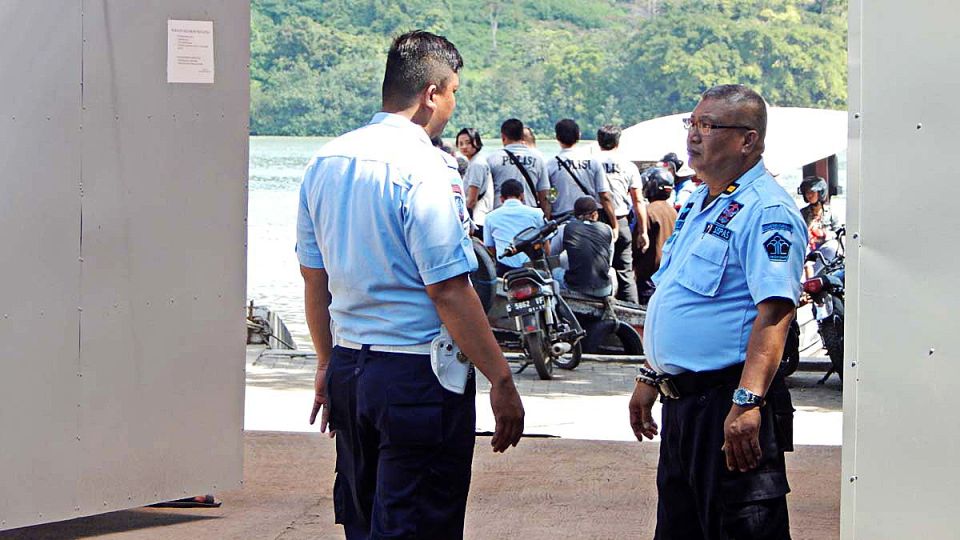October 23, 2025
JAKARTA – More than 1,000 prison guards are undergoing retraining at the maximum-security prisons on Nusakambangan Island, following a string of scandals involving criminal activities orchestrated from behind bars, a senior minister has said.
Coordinating Minister for Law, Human Rights, Immigration and Correctional Services Yusril Ihza Mahendra said the retraining program was intended to reinforce discipline among correctional officers and improve their oversight of inmates, particularly to curb the widespread circulation of narcotics within penitentiaries across the country.
“The most serious problem in our correctional facilities is drug trafficking. It’s a major issue,” he said as quoted by Kompas.com.
Nusakambangan is a remote island off the southern coast of Cilacap regency, Central Java, and is known as the country’s most secure prison island. Often called “Indonesia’s Alcatraz,” it houses several maximum-security prisons that detain drug lords, terrorists and high-profile criminals. Built by the Dutch in 1908, the island now has 11 prisons with a total capacity of around 3,000 inmates.
The decision to launch the retraining initiative comes amid heightened scrutiny of Indonesia’s correctional system, after it was revealed that actor Ammar Zoni, who was serving a four-year sentence at Salemba Penitentiary in Central Jakarta for narcotics-related charges, was allegedly involved in drug trafficking inside the facility, along with five other inmates.
During a raid in January, authorities discovered marijuana and methamphetamine in Ammar’s possession. He is believed to have obtained the drugs from a friend who visited him in prison, underscoring serious security and oversight lapses at the facility.
The Central Jakarta Prosecutor’s Office is currently handling the case. Ammar and the other suspects have since been transferred to Nusakambangan, where they will remain in custody pending trial.
Read also: Inmate killed in fight at overcrowded prison in North Sumatra
Meanwhile, North Sumatra Police’s Cyber Directorate also recently uncovered a scamming syndicate operating from inside Tanjung Gusta Penitentiary in Medan.
Two of the alleged masterminds, Muhammad Syarifuddin Lubis and Rizal, are narcotics convicts who reportedly coordinated the fraud scheme with accomplices outside the prison.
One of their victims was Rahmat Syah, the Turkish honorary consul-general for Sumatra, who lost Rp 254 million (US$15,300) in the scam.
According to police, Syarifuddin impersonated Rahmat’s daughter, actress Raline Shah, by using her profile photo and name on WhatsApp. He allegedly sent messages to Rahmat posing as Raline, requesting money under the pretense of needing it to purchase gold.
Minister Yusril stated that several prison officials and correctional officers have been demoted or dismissed in connection with the recent scandals. However, he did not specify the exact number of personnel affected.
As part of the crackdown on violations inside penitentiaries, the government has also mandated that all prison staff across the country sign a formal commitment to prevent the circulation of mobile phones within detention centers and correctional facilities. Inmates are strictly prohibited from possessing or using mobile phones, and prison officers are now barred from bringing their devices into inmate housing blocks.
Minister Yusril stated that the government is preparing to revise the 2009 Narcotics Law, with a focus on more clearly distinguishing between drug users and drug dealers.
“Not all users should be incarcerated. This change will reduce the prison population,” Yusril explained.
Data released by the Immigration and Corrections Ministry in August revealed that Indonesia’s prison system is operating at 93 percent over capacity, with 281,762 inmates housed across the country despite facilities being designed to hold a maximum of 146,260 people.
Read also: Nineteen inmates escape from Central Papua prison
This severe overcrowding, coupled with chronic understaffing, underfunding, poor management and instances of corruption, has contributed to a string of prison riots, escape attempts and drug operations run by inmates.


